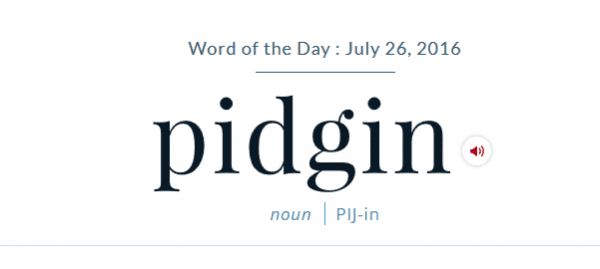
Definition
: a simplified speech used for communication between people with different languages
Examples
"In his 1992 book, A History of American English, the late linguist J.L. Dillard … demonstrates that the most originally American form of English was a pidgin, originating with sailor's language. Early explorers of North America, he argues, would have used nautical pidgins and passed those on to native people." — Sarah Laskow, Atlas Obscura, 17 July 2015
"Hawaiian Pidgin English developed during the 1800s and early 1900s, when immigrant laborers from China, Portugal, and the Philippines arrived to work in the plantations; American missionaries also came around that time. The immigrants used pidgins—first one that was based in Hawaiian and then one based in English—to communicate." — Alia Wong, The Atlantic, 20 Nov. 2015
Did You Know?
The history of pidgin begins in the early 19th century in the South China city of Guangzhou. Chinese merchants interacting with English speakers on the docks in this port adopted and modified the word business in a way that, by century's end, had become pidgin. The word itself then became the descriptor of the unique communication used by people who speak different languages. Pidgins generally consist of small vocabularies (Chinese Pidgin English has only 700 words), but some have grown to become a group's native language. Examples include Sea Island Creole (spoken in South Carolina's Sea Islands), Haitian Creole, and Louisiana Creole. The word pidgin also gave us one particular meaning of pigeon—the one defined as "an object of special concern" or "accepted business or interest," as in "Tennis is not my pigeon."

